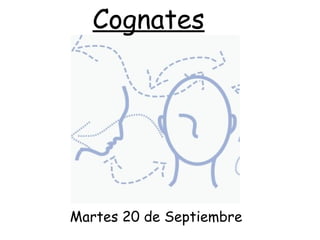
Cognates[1]
- 1. Cognates Martes 20 de Septiembre
- 2. Improve your Spanish vocabulary for free, yes you heard me.... for a short time only I will be offering you nearly 4000 words ........for absolutely nothing, all you have to do is follow these few simple steps....... OBJECTIVE: To analyse Spanish – English cognates to help BOOST vocabulary
- 3. You can learn Spanish cognates by learning a few simple rules and applying them to your existing knowledge of English. In this way you can quickly expand your Spanish vocabulary. Spanish is a language that evolved from Latin over the last two thousand years. English, although it is not as closely related to Latin as Spanish, takes thousands of Latin words, many of them the same words that Spanish uses. In addition, both languages have borrowed many words from Classical Greek. This results in thousands of cognates between English and Spanish.
- 4. Let’s try some out........ Spanish words that end in -a, -o or -e very often have an equivalent in English. Simply drop or change the last vowel. causa drama creativo figura aire líquido favorito caso forma guitarra lista credito dieta mapa lista costo persona medicina
- 5. Words that end in -ary in English very often have a Spanish cognate that ends in -ario diccionario disciplinario literario aniversario ordinario necesario vocabulario salario itinerario
- 6. English words that end in -ic usually have a Spanish cognate that simply adds an -o. democrático didáctico sarcástico fantástico lunático escolástico linguístico Atlántico romántico automático patriótico optimístico fanático gimnástico
- 7. Like the previous category, English words that end in -ical have a Spanish cognate that ends in -ico. periódico (newspaper,periodical) cómico clásico metódico histérico práctico técnico político físico sicológico (psychological) eléctrico
- 8. English words that end in -ent often have a cognate in Spanish that ends in -ente. These words are usually adjectives. agente inteligente indiferente suficiente diferente equivalente potente cliente patente Words that end in -ment in English have equivalents in Spanish that simply add an -o. These words are nouns. sacramento testamento suplemento sentimiento (sentiment) argumento argumento
- 9. English words that end in -or often have a Spanish cognate that is identical. doctor motor actor profesor florista director error color humor autor (author) English words that end in -ist often have a Spanish cognate. pianista artista recepcionista moralista turista
- 10. There are many Spanish cognates that end in -cion. The equivalent English word ends in -tion. Note that all of these words have the stress on the final syllable. Also, all of these words are feminine in gender Words that in in -dad are quite common in Spanish. They usually correspond to an English word that ends in -ty. All of these words are feminine in gender English words that end in -ence or -ance often have a Spanish cognate that ends in -encia or -ancia English words that end in -ent often have a cognate in Spanish that ends in -ente. These words are usually adjectives. Some English words that end in -ous have a Spanish cognate that ends in -oso.
- 11. There are many Spanish cognates that end in -ción. The equivalent English word ends in -tion. Note that all of these words have the stress on the final syllable. Also, all of these words are feminine in gender. acción degeneración administración descripción admiración eliminación animación experimentación aplicación información asociación investigación atención organización celebración representación combinación transformación concentración transportación contaminación vegetación creación vocación
- 12. words that end in- mente (as opposed to just -ente). They usually have an English cognate that ends in -ly. These are adverbs. Words that end in -al in both English and Spanish are often cognates -ant (or sometimes -ent)words in English sometimes end in -ante in Spanish.
